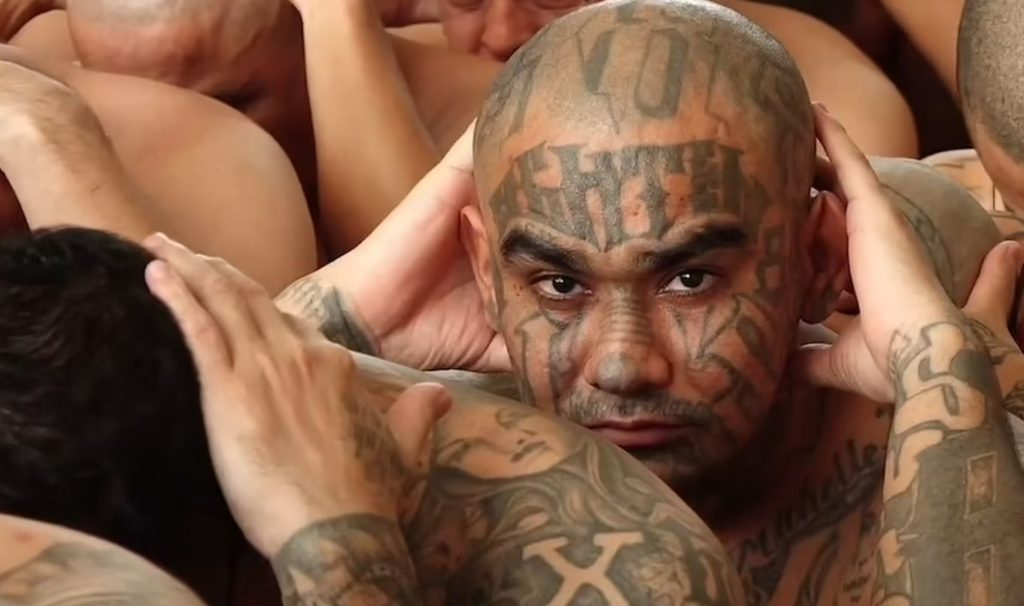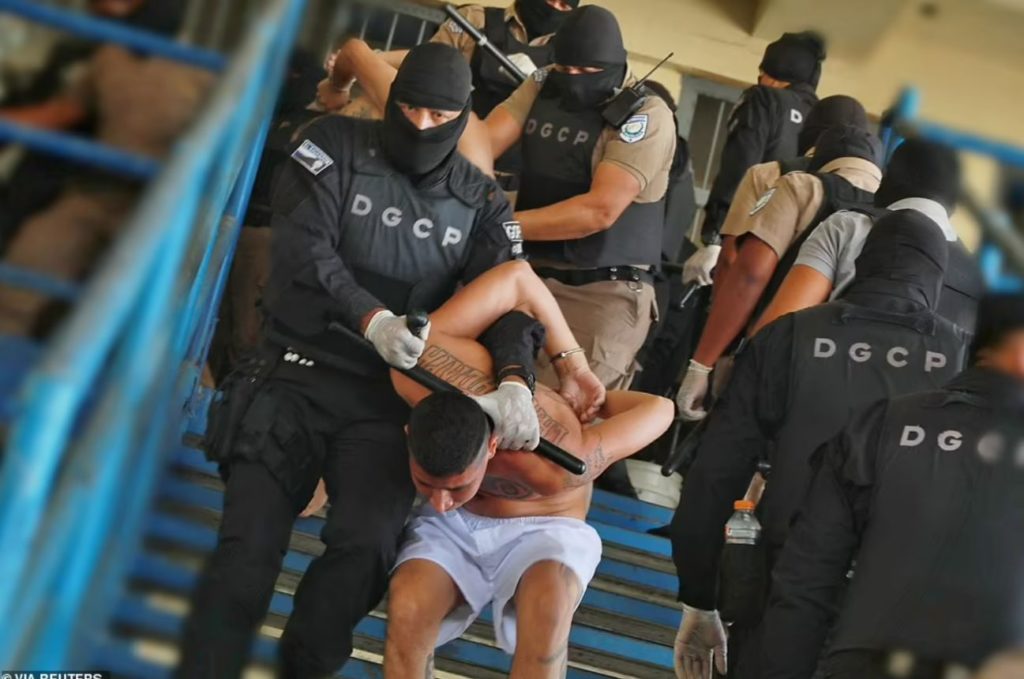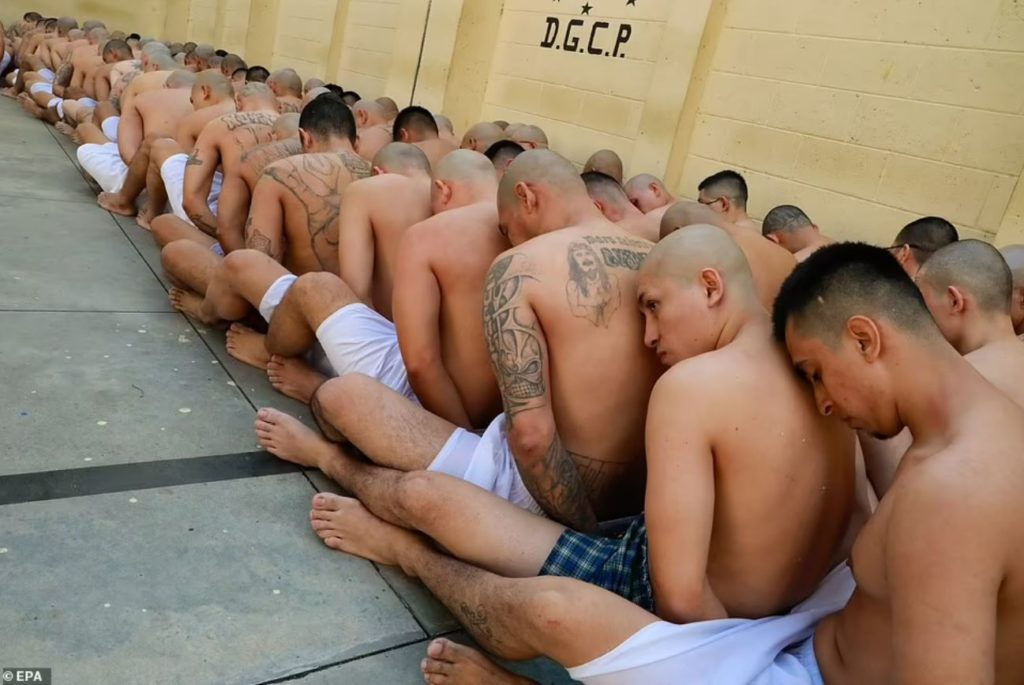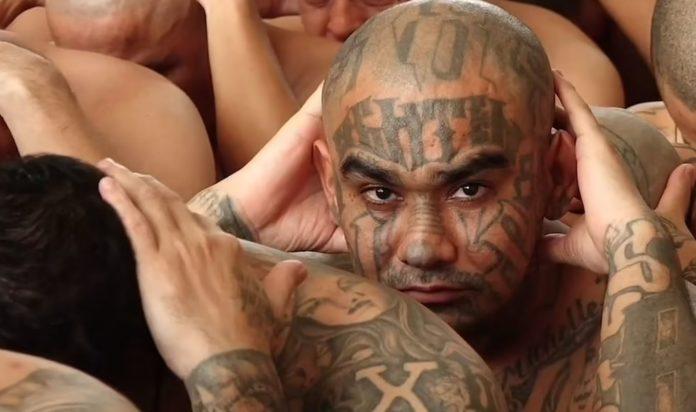El Salvador’s President Nayib Bukele responds to the increase in street violence, which last weekend left 82 people murdered in El Salvador, increasing the pressure on imprisoned gang members.
A group of hooded state agents enter a Salvadoran prison. They soon begin dragging semi-naked inmates out of their cells. Facial tattoos give away the inmates: they are gang members. They stumble through the corridors, their hands tied behind their backs, as they are led on the run by their captors. They arrive at a patio, where they are seated on the ground and photographed together with hundreds of prisoners in the same situation and then they are taken to collective cells in places where the light of the sun doesn’t reach.

This is President Nayib Bukele’s response to the defiance initiated by the gangs last weekend when 82 people were murdered in the streets of El Salvador; some homicides attributed to these organized criminal gangs —considered terrorists by El Salvador and the United States— that have 64,000 members and extensive territorial control in the marginal neighborhoods of the Central American country.
“We confiscated everything, even their sleeping mats, we also rationed their food. Stop killing now or they (the incarcerated) are going to pay for it too,” Bukele wrote, threatening the ‘maras’ by making 16,000 imprisoned gang members hostage.
The actions have earned him, once again, the criticism of a large part of the organizations of the international community, which point to growing authoritarianism in Bukele’s management. The president has responded, as usual, with a virulent accusation of NGOs and institutions critical of his administration.
MENSAJE A LAS PANDILLAS:
— Nayib Bukele (@nayibbukele) March 28, 2022
Tenemos 16,000 “homeboys” en nuestro poder.
Aparte de los 1,000 arrestados en estos días.
Les decomisamos todo, hasta las colchonetas para dormir, les racionamos la comida y ahora ya no verán el sol.
PAREN DE MATAR YA o ellos la van a pagar también. pic.twitter.com/gpelYbhsQE

“These international NGOs say they watch over human rights, but they are not interested in the victims, they only defend murderers, as if they enjoyed seeing the bloodbaths,” he cried indignantly, again, through the Twitter account. – translated-
“Come for them, take them to their countries, get them out of this “dictatorial and authoritarian persecution”. You can help these little angels, do not allow us to continue ‘violating their rights,'” added the president in his umpteenth clash with organizations such as Humans Rights Watch, Amnesty International, the Organization of the American States and Washington. -translated-

How did he get here?
Enemies of the people
Despite the controversial measure, the Salvadoran president enjoys spectacular popularity, with the support of 71% of Salvadorans, according to pollster Warren Mitofsky, leading the list of the best-valued leaders in Latin America. It is not difficult to guess why. Bukele was born 40 years ago into a wealthy family, the son of an engineer of Palestinian origin and a mother of Catholic roots.
His successful and early experience in the advertising sector led to a meteoric political career, initiated in the ranks of the leftist Farabundo Martí National Liberation Front (FMLN), the party that emerged from the guerrillas that fought in the Salvadoran armed conflict. In 2012 he became mayor of the town of Nuevo Cuscatlán, and three years later he would go on to govern the capital, San Salvador. Shortly after, he left the leftist formation amid deep criticism and created his New Ideas movement to go all out to win the presidency.
His strategy was clear: the two formations that had shared power since the end of the civil war—the FMLN and the right-wing Alianza Republicana Nacionalista (Arena)—were useless and had to be overthrown. He is not without reason. The governments of the two traditional parties were mediocre economically and extremely corrupt politically. Arena leaders had been involved in some of the bloodiest events of the war, such as the murder in 1989 at the hands of the Army of two women and six Jesuit priests, five of them Spanish, of which former president Alfredo Cristiani has recently been accused. (Sand, 1989-1994). Bukele’s two predecessors, Salvador Sánchez Cerén and Mauricio Funes of the FMLN are exiled in Nicaragua to escape the arrest warrants that weigh against them on various charges of corruption.
Under their governments, El Salvador became one of the most violent countries in the world outside of war zones. In 2015, the small Latin American nation registered a record violence rate on the continent, with 103 homicides per 100,000 inhabitants, sealing the failure of the traditional policy that paved the way for the arrival of Bukele.
“He built a narrative in which he pretended to be outside the traditional political class, or what he called “the same as always” and [Bukele] took it upon himself to promise a new country, in which there was a place for the bad, for the politicians who had governed during the last decades and who, in that narrative, were the enemies of the people and the villains of the film,” explains Eduardo Escobar, lawyer and director of Acción Ciudadana.
“That narrative undoubtedly managed to permeate the collective imagination, even at a sect level, and that catapulted him. The Salvadoran population manages a more authoritarian than democratic political culture and is willing to have an authoritarian leader as long as they solve their problems,” adds the analyst.
An autocrat in the making?
Bukele swept the 2019 elections, achieving victory in the first round with 53% of the vote. He soon clashed with the country’s Legislative Assembly and their problems and accusations of authoritarianism began. Since he began his term with scant representation in a parliament still dominated by Arena and the FMLN, his proposals were blocked or delayed by his political rivals, which degenerated into the first major institutional crisis of the era.
In February 2020, the president ordered the entry of dozens of soldiers to the Legislative Assembly due to the delays of the deputies to approve a loan of $109 million that he requested to improve the conditions of the Police and the Armed Forces.
The image of Bukele entering the hemicycle surrounded by soldiers with machine guns and sitting in the chair of the congressional leader deteriorated his international image and provoked criticism from countries such as the United States and the European Union. But inside the country, his support was not only intact but had increased.
The reason was the spectacular decline in violence that was beginning to be felt in the streets. The country even recorded days without a single murder, something unprecedented for decades. Violent death records continued to fall for months. In 2021 the country has ended up setting a rate of 18 homicides per 100,000 inhabitants, far from the terrible figures of just six years earlier. That, in a population that lived in terror, means amassing enormous popularity.
How did Bukele manage to reduce the rates of violence to unprecedented levels in recent decades? The president attributes the success to his Territorial Control Plan, a scheme that involves the Armed Forces and prison policies, and which is kept secret. But journalistic investigations by the independent media outlet ‘El Faro’, confirmed by the US, revealed that the president would have agreed to reduce violence with the gang leaders in exchange for various benefits, something that the president has categorically denied.
The events of the past week, on the other hand, seem to point to a coordinated exercise by the gang members to attack the State. The profile of those killed, many of them peasants, vendors or bakers with no criminal record, is the announcement of a challenge. The massacre, with 62 murders on Saturday alone, was not the result of a clan war. The abandonment of a corpse on the road that leads to Surf City, one of the Government’s emblematic tourist projects, has been seen by analysts as a message to Bukele.
The president, who had previously gone after imprisoned gang leaders to try to reduce crime, knows that —beyond infrastructure works and innovative projects— his popularity is based on keeping levels of violence low, even with a firm hand. This was demonstrated in the 2021 legislative elections when his party achieved 66% of the votes and won 56 of the 84 seats in the hemicycle —which with his allies reached an unbeatable legislative majority of 64 deputies.
“The electoral campaign of all the candidates for deputies of Nuevas Ideas revolved around the image of Bukele. His offer was he is president, they would support everything the president said,” explains analyst Escobar. “Once elected we find that 70% or 80% of the initiatives supported in the Legislative come from the Presidential House. The deputies have to read what they are sent. They have no knowledge of the issues. They have no idea of the implications. They do not discuss the initiatives, they simply pantomime the convictions, draw up an opinion and take it to the plenary, where it is automatically approved without going through commissions, without discussion, or anything. There is not the slightest margin to think that they are independent,” adds the lawyer.
Judicial control and crisis with the US
The legislative victory only increased the signs of authoritarianism. The first measure taken by the new Congress was the dismissal of the five judges of the Constitutional Chamber of the Supreme Court of Justice, arguing that they had issued verdicts contrary to executive decrees during the pandemic. Ten of the fifteen judges of the supreme court ended up on the street, twice as many as usual. In addition, a third of all judges in the country were also replaced, retiring all those over 60 years of age. Finally, the Attorney General, Raúl Melara, who had carried out the investigations into the alleged talks between Bukele officials and the gangs in the prisons cited by ‘El Faro’, was removed from office.
The Assembly, led by the Executive, appointed their substitutes.
“There they took control of the judicial order. Bearing in mind our political past, they have some influence over those magistrates. And if there isn’t, they know that their positions hang in the balance and they can be removed when Bukele orders it,” Escobar comments.
The Constitutional Chamber of the Supreme soon showed its new color, endorsing, in September 2021, the presidential re-election, something expressly prohibited by the Magna Carta. The magistrates displayed a twisted interpretation of various legal provisions, something that is not new in Latin America and that does not usually augur well.
The growing criticism of the United States in the face of the succession of scandals and its own involvement in the investigations – Washington even reported that they offered prostitutes to imprisoned gang members to keep the violence under control – deeply distanced Bukele from the White House. The North American country came to sanction officials identified as corrupt and a New York court plans to charge two officials who allegedly participated in negotiations with gang leaders in prison.
“We have seen that movie before, in places like Venezuela, where someone uses popularity to create an authoritarian system, and that has not been very good for the Venezuelan people,” said Juan González, adviser to President Joe Biden and head of the National Security Agency for the Western Hemisphere, to the EFE agency last October.
A few weeks ago González led the delegation that met in Caracas with President Nicolás Maduro to, according to Reuters, offer the return of oil purchases in exchange for Venezuela resuming talks with the opposition and making democratic reforms.
He left it to Bukele: “The US government decides who is the bad guy and who is the good guy and also when the bad guy becomes good and the good guy turns bad,” the Salvadoran president wrote on Twitter on March 8.
An outstanding debt
As El Salvador moved away from the US, it was approaching other geostrategic poles such as Russia —Bukele is scheduled to visit Moscow in June to meet with Vladimir Putin— and Turkey. The Central American country was among the 35 that abstained from condemning the Russian invasion of Ukraine at the UN, aligning itself in the region with Nicaragua, Cuba, and Venezuela. Something that caught the attention of analysts since Bukele, known as the Twitter president, is far from the Latin American far-left and has even harshly criticized Maduro and the Nicaraguan, Daniel Ortega.
His rapprochement with other centers of power is also economically motivated, according to analysts. El Salvador has debt equivalent to 85% of its GDP, high in the Latin American context, and must face a debt maturity of $800 million in January 2023. The deficit is expected to remain high this year, after Bukele has had to give up some income, especially fuel, due to the global situation. The Treasury assures that there will be no problem paying next year, but analysts are not so sure, and the rating agencies have already lowered the Salvadoran bond to a junk level.
The talks with the International Monetary Fund regarding a loan of $1.3 billion are, furthermore, stalled, both due to the distancing from the US and due to the doubts of the Washington-based institution with Bukele’s most ground-breaking measure: establishing the Bitcoin cryptocurrency as legal tender in El Salvador, which now coexists alongside the official one, the US dollar, adopted two decades ago.
The plan came into force last September and put the country at the center of world economic information for several days; a pride for part of a citizenry sadly accustomed to their country only giving negative headlines abroad.
Bukele assured that the adoption of Bitcoin would bring investments to El Salvador, would integrate the 70% of citizens who do not have a bank account into finances, and would allow salvadorans to save $400 million annually in commissions for receiving remittances sent for their migrant relatives. In other words, those millions would stay in the country and circulate in stores. However, six months into the experiment, there are many problems.
70% of Salvadorans distrust Bitcoin and 91% prefer the dollar, according to a survey by the Francisco Gavidia University. In addition, the national virtual wallet application, Chivo Wallet, to manage cryptocurrency has had several failures and needs the internet to function in a country where 55% of the population lives without internet access. The state of the accounts is also very opaque. The only thing that is known, according to the president’s tweets, is that El Salvador has bought some 1,800 bitcoins.
According to analysts who have followed the president’s messages, and calculated the value of the purchases taking into account the value of Bitcoin when the president tweets, the total price of the purchases has been about $86 million.
El Salvador tried in March to place a bond in Bitcoins with a value of more than $1,000 million but finally gave up due to the international context. The official version is that half of the money would be used to buy new Bitcoins and the other half to build Bitcoin City at the foot of the Comayagua volcano, which, with its geothermal energy, would power the city and allow the installation of farms to mine bitcoins. But part of some analysts considers that Bukele also plans to finance the country with that issue and thus be able to avoid the IMF and other international organizations.
Military and anti-press cocktail
The main blows have been taken by the portal ‘El Faro’. Its managers have denounced “economic suffocation” after Bukele announced that the publication was being investigated for alleged money laundering and tax evasion. Its’s editor was expelled from the country on the grounds that immigration had failed to verify that he was a journalist. The investigative website is banned from the presidential palace and also denounced that 22 of its reporters had been spied on using Pegasus software, which the Israeli NSO Group only sells to governments.
“Have you noticed that the self-proclaimed uncomfortable journalists stopped investigating the opposition? More than a year ago they stopped being journalists and became political activists. It is valid that they do it, it is a free country,” the president wrote on Twitter in December 2020.
To complete the mix, Bukele is fueling the preponderance of the Army. At the beginning of March, hundreds of soldiers took to the streets to drive the 300 urban buses of a company accused of having failed to comply with the presidential order not to raise fares after lowering fuel taxes.
“We will double our Armed Forces in the next 5 years, starting today. Every fifteen weeks, a group of new soldiers will enter. The new order is to bring it to 40,000 brave and patriotic men and women,” Bukele assured last July.
The true nature of the very popular Bukele will be revealed, as usually happens, when the support of the population decreases, something that will surely happen sooner or later, taking into account all known precedents. Only then will we know if the Salvadoran leader is definitively committed to democracy or authoritarianism.
Image Credit: EPA / Reuters
You were reading: El Salvador takes 16,000 imprisoned gang members hostage: “now they will no longer see the sun”
